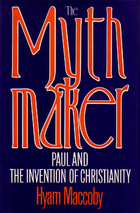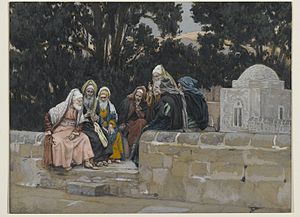Updated 18th January, 2013. 8:40 pm.
I recently confessed that I have too often written with the assumption that my points are surely so well-known that there is no need to explain them. This post attempts to make amends for one such recent gaffe. I explain why I claimed Hoffmann is out of touch with most scholarship with his views of the Judaism of Jesus’ and Paul’s day.
In my latest post addressing Hoffmann’s argument for an historical Jesus, I dismissed his claim that Paul came from a tradition that knew only a vengeful God incapable of forgiveness. I assumed most readers would know that such a view of the Judaism of the early and mid first century is widely understood to be a misinformed caricature of reality. One commenter pulled me up on that point.
So here I quote views of scholars on the nature of Judaism, and the Pharisees in particular, in the time of Jesus and Paul. First, here are Hoffmann’s words:
[Paul] finessed his disagreements into a cult that turned the vindictive God of his own tradition into a being capable of forgiveness.
I brushed this aside with the following comment:
I am astonished that Hoffmann would write such an unsupportable caricature as if it were fact. His view is surely out of touch with most scholarship that has addressed this question.
So I pulled out books from my shelves that I could quickly identify as having something to say about this question. I avoided any titles that might be associated with scholars of mythicist leanings or left-right-out-radicals, however. I tried to stick to well-known or highly respected names in the field and especially to include relative “conservatives” in the mix.
So here are the sorts of things I have been reading over the years and that have led me to conclude that certainly a good number of scholars no longer accept Hoffmann’s characterization of Judaism or Pharisaism today. Note the number of times they denounce as a modern myth any notion that God was harsh or that Jews did not know divine forgiveness.
 Hyam Maccoby: The Mythmaker: Paul and the Invention of Christianity (1986)
Hyam Maccoby: The Mythmaker: Paul and the Invention of Christianity (1986)
In recent years, many Christian scholars have come to realize that this Gospel picture of the Pharisees [i.e. severely and cruelly legalistic, hypocritical and self-righteous] is propaganda, not fact. Our main source of authentic information about the Pharisees is their own voluminous literature, including prayers, hymns, books of wisdom, law books, sermons, commentaries on the Bible, mystical treatises, books of history and many other genres. Far from being arid ritualists, they were one of the most creative groups in history.
Moreover, the Pharisees, far from being rigid and inflexible in applying religious laws, were noted (as the first-century historian Josephus points out, and as is amply confirmed in the Pharisee law books) for the lenience of their legal rulings, and for the humanity and flexibility with which they sought to adapt the law of the Bible to changing conditions and improved moral conceptions. . . . (p. 19) Continue reading “Pharisees and Judaism, Popular (Gospel) Caricatures versus Modern Scholarly Views”

